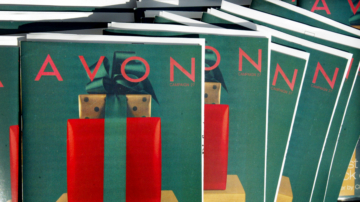【新唐人2014年04月12日訊】「中國導演協會」本應在4月9號頒發年度最佳導演、與年度最佳影片兩個大獎。然而令人驚訝的是,馮小剛領銜的評委會竟然讓這兩項大獎空缺。評委之一的大陸導演王小帥對本臺記者表示,他們希望通過這個舉動,向電影界敲響警鐘,不要僅僅向錢看,在市場化的同時,要更加尊重電影的藝術成分。
「中國電影導演協會」2013年度頒獎儀式,日前在北京舉行,評委團主席導演馮小剛宣佈,本年度「最佳影片和最佳導演兩項大獎空缺」。馮小剛對此解釋說:「最佳電影及最佳導演兩個重要獎項的空缺,是出於作為導演的良知和對藝術的尊重。作為導演協會的獎項不應該以自娛自樂、皆大歡喜為目地,而是樹立一個更高的標準。」
網絡輿論猜測,中國導演協會對中共的電影審查制度不滿。
不過,評委團九個評委之一的大陸導演王小帥告訴《新唐人》,大獎空缺的決定,跟審查制度沒有直接關係。他們認為,入圍的五部影片未能達到他們心目中的標準。他們也希望通過這個舉動,喚起大家對電影本體,電影創作,電影藝術更大的尊重,在市場化的同時更尊重電影的藝術成分。
大陸電影導演王小帥:「近年來確實,大家也都看到了。整個的票房是在上升。但是也確實包括業內、包括觀眾也在說,有些是票房很好,但是製造的比較粗糙,觀眾不能滿意。這些都是值得思考的。作為我個人來說,這是一個過程,在市場化在原始積纍過程中的一些過程。電影熱,電影院建的越來越多,有很多的熱錢會進來,會純粹從錢的角度主宰了電影的創作這個本體。」
王小帥表示,在中國電影市場化以後,大家在金錢上博弈,由市場來決定創作。可能會出現快餐型電影,或者掙快錢的電影,因此製作的精良程度,故事,藝術造詣,或者編劇和導演表達,可能會出現落差。同時他也承認,電影審查制度會讓電影的本質流失。
王小帥:「審查如果這方面掣肘了一些導演的想像力或者編劇和導演一些創作禁區太多,那麼肯定會影響到我們中國電影的整體的發展。」
王小帥表示,近幾年,中國電影更經受了雙重的壓力。除了審查上的壓力,還有市場上的壓力。同時,創作上還可能遭遇審查或題材上的禁區,因此中國的電影創作還是很艱難。
有人猜測,大獎空缺,是抗議中共去年封禁賈璋柯所導的《天注定》。《天注定》先前已經提交給導演協會參與獎項的競逐,但是在3月底時又收回了申請。片方在微博中表示,由於無法將影片通過發行的DVD,或者網絡播放形式,提交導演協會,所以不得不退出評選。
《天注定》片中涉及中國社會許多不公、及暴力橫行等陰暗面,贏得了國際「戛納電影節」最佳劇本獎等多個獎項,但在中國大陸卻無法如期於去年10月上映。王小帥表示,賈樟柯撤回評選,可能是因為影片遲遲不能夠公映。
大陸文化評論家葉匡政表示,因為中國電影市場這幾年隨著電影院院線的增加,中國每年的票房也在不斷的增長,去年突破了100億元大關。但是其實大多數觀眾還是衝著進口片去的。
大陸文化評論家葉匡政:「因為民眾感興趣的這些本土題材電影基本上都被限制了,比如講民族問題,宗教問題,就是一些大的歷史事件,包括一些苦難事件,其實都是在禁區之中的,就是你不允許拍的。所以這種優秀的本土題材電影,基本上就連創作的空間都沒有,就不要說市場空間了。這就導致電影只能在一些非常狹隘的狹小的空間裡面進行運作。這個對中國電影的傷害是非常大的。」
葉匡政表示,中國在電影製作技術或特效方面,遠遠落後於西方電影。唯一能夠讓中國電影有所成長的,就是題材的特殊性。但是這些特殊題材都受到了審查制度的限制,後果就是,中國的電影市場會越來越讓位給美國電影。
採訪編輯/秦雪 後製/李智遠
China Directors Guild Sound Alarm: Declines to Award ‘Best Film’ and ‘Best Director’ to Short-List.
On April 9, the Chinese Director Guild should have
awarded it's annual ‘Best Film’ and ‘Best Director’.
Surprisingly, however, the jury, led by Feng Xiaogang,
chose not to give any of the short-listed films an award.
One judge, mainland director Wang Xiaoshuai told
reporters that they hope to sound an alarm by doing this.
They want to not to just look at the money made by the film,
but to give more respect to the artistic component of the film.
On April 9, the annual awards ceremony for
the Chinese Directors' Guild was held in Beijing.
Feng Xiaogang, Chairman of the jury, announced that they
had not awarded any film with ‘Best Film’ or ‘Best Director’.
Feng explained that the decision was out
of director’s conscience and respect for art.
“The awards should not be about
our own enjoyment and satisfaction.
Rather, it should set a standard
that everyone must strive towards.
They can only attain this by standing on
their tiptoes and reaching with all their might.”
Netizens speculate that the Chinese Director’s
Guild is making a stand against film censorship.
Wang Xiaoshuai, one of the
directors on the jury, spoke to NTD.
There is no relationship between censorship,
and the choice to not give these awards.
The jury thought that the five short-listed
films failed to meet the standard.
They hope to evoke more respect for the film industry itself.
More respect for movie creation and movie
art, as well as a films market performance.
Wang Xiaoshuai, Mainland Film Director:
“Recently, we have seen the whole box office rising.
Even the audience and people from the movie industry said
that some films with good box office ratings are poorly made.
Lots of money is made through popular movies, and more
and more the industry will start to create films just for money.
Wang Xiaoshuai said they might try to make
more money after the film is marketed, or the
making of the film is decided by market demand.
This might create ‘fast food’ type movies, or ‘quick buck’ type
movies, which have a big difference in terms of production,
story, artistic skills, screenwriting, and directorial expression.
In addition, he also believes film censorship
makes a film lose it’s nature, and it’s essence.
Wang Xiaoshuai:”Censorship will influence China’s
development if it has too much impedance on imagination
or creates forbidden zones for the directors’ creation.
Wang Xiaoshuai comments that in recent years, the
Chinese film industry has suffered from a double pressure.
Censorship and market pressure.
It’s very hard in China to make a movie, because it may
enter the forbidden zones of censorship or subject matter.
Some speculate that the leaving the award
vacant was in protest against Beijing's decision
last year to block the release of ‘A Touch of Sin’.
‘A Touch of Sin’ is a film by acclaimed director
Jia Zhangke. and was initially submitted for
consideration for the Directors' Guild awards.
It was withdrawn late last month, according to a
microblog posting by Jia's production company.
“Since we aren't able to provide the China Directors'
Guild with a DVD or online copy of 'A Touch of Sin',
we have applied for the film to be withdrawn.
A Touch of Sin involves subject matter of social injustice,
rampant violence and other dark sides of Chinese society.
It has won several awards at the
international Cannes Film Festival.
It could not be released as scheduled
in mainland China in last October.
Wang Xiaoshuai said the movie withdrawal is
probably because the movie failed to release.
Chinese cultural critic Ye KuangZheng said
the China film box office is growing every year.
It exceeded 100 billion yuan last year, with
increases in the theater cinema circuit.
However, most audiences went to see imported films.
Ye KuangZheng:”The subject matter includes ethnic
issues, religious issues and some major historical events.
These subjects are all restricted, although
the Chinese people are interested in it.
So there is no creative space, not to mention market space.
It really hurts the Chinese movie industry,
because we can only operate in a narrow space.
Ye KuangZheng said that filmmaking technology or special
effects in Chinese films are far behind Western counterparts.
The only particular growing space
for Chinese films is in the theme.
The result is US films will take more and more
places in the Chinese film market because
popular China themes are restricted by censorship.
China in terms of
「中國電影導演協會」2013年度頒獎儀式,日前在北京舉行,評委團主席導演馮小剛宣佈,本年度「最佳影片和最佳導演兩項大獎空缺」。馮小剛對此解釋說:「最佳電影及最佳導演兩個重要獎項的空缺,是出於作為導演的良知和對藝術的尊重。作為導演協會的獎項不應該以自娛自樂、皆大歡喜為目地,而是樹立一個更高的標準。」
網絡輿論猜測,中國導演協會對中共的電影審查制度不滿。
不過,評委團九個評委之一的大陸導演王小帥告訴《新唐人》,大獎空缺的決定,跟審查制度沒有直接關係。他們認為,入圍的五部影片未能達到他們心目中的標準。他們也希望通過這個舉動,喚起大家對電影本體,電影創作,電影藝術更大的尊重,在市場化的同時更尊重電影的藝術成分。
大陸電影導演王小帥:「近年來確實,大家也都看到了。整個的票房是在上升。但是也確實包括業內、包括觀眾也在說,有些是票房很好,但是製造的比較粗糙,觀眾不能滿意。這些都是值得思考的。作為我個人來說,這是一個過程,在市場化在原始積纍過程中的一些過程。電影熱,電影院建的越來越多,有很多的熱錢會進來,會純粹從錢的角度主宰了電影的創作這個本體。」
王小帥表示,在中國電影市場化以後,大家在金錢上博弈,由市場來決定創作。可能會出現快餐型電影,或者掙快錢的電影,因此製作的精良程度,故事,藝術造詣,或者編劇和導演表達,可能會出現落差。同時他也承認,電影審查制度會讓電影的本質流失。
王小帥:「審查如果這方面掣肘了一些導演的想像力或者編劇和導演一些創作禁區太多,那麼肯定會影響到我們中國電影的整體的發展。」
王小帥表示,近幾年,中國電影更經受了雙重的壓力。除了審查上的壓力,還有市場上的壓力。同時,創作上還可能遭遇審查或題材上的禁區,因此中國的電影創作還是很艱難。
有人猜測,大獎空缺,是抗議中共去年封禁賈璋柯所導的《天注定》。《天注定》先前已經提交給導演協會參與獎項的競逐,但是在3月底時又收回了申請。片方在微博中表示,由於無法將影片通過發行的DVD,或者網絡播放形式,提交導演協會,所以不得不退出評選。
《天注定》片中涉及中國社會許多不公、及暴力橫行等陰暗面,贏得了國際「戛納電影節」最佳劇本獎等多個獎項,但在中國大陸卻無法如期於去年10月上映。王小帥表示,賈樟柯撤回評選,可能是因為影片遲遲不能夠公映。
大陸文化評論家葉匡政表示,因為中國電影市場這幾年隨著電影院院線的增加,中國每年的票房也在不斷的增長,去年突破了100億元大關。但是其實大多數觀眾還是衝著進口片去的。
大陸文化評論家葉匡政:「因為民眾感興趣的這些本土題材電影基本上都被限制了,比如講民族問題,宗教問題,就是一些大的歷史事件,包括一些苦難事件,其實都是在禁區之中的,就是你不允許拍的。所以這種優秀的本土題材電影,基本上就連創作的空間都沒有,就不要說市場空間了。這就導致電影只能在一些非常狹隘的狹小的空間裡面進行運作。這個對中國電影的傷害是非常大的。」
葉匡政表示,中國在電影製作技術或特效方面,遠遠落後於西方電影。唯一能夠讓中國電影有所成長的,就是題材的特殊性。但是這些特殊題材都受到了審查制度的限制,後果就是,中國的電影市場會越來越讓位給美國電影。
採訪編輯/秦雪 後製/李智遠
China Directors Guild Sound Alarm: Declines to Award ‘Best Film’ and ‘Best Director’ to Short-List.
On April 9, the Chinese Director Guild should have
awarded it's annual ‘Best Film’ and ‘Best Director’.
Surprisingly, however, the jury, led by Feng Xiaogang,
chose not to give any of the short-listed films an award.
One judge, mainland director Wang Xiaoshuai told
reporters that they hope to sound an alarm by doing this.
They want to not to just look at the money made by the film,
but to give more respect to the artistic component of the film.
On April 9, the annual awards ceremony for
the Chinese Directors' Guild was held in Beijing.
Feng Xiaogang, Chairman of the jury, announced that they
had not awarded any film with ‘Best Film’ or ‘Best Director’.
Feng explained that the decision was out
of director’s conscience and respect for art.
“The awards should not be about
our own enjoyment and satisfaction.
Rather, it should set a standard
that everyone must strive towards.
They can only attain this by standing on
their tiptoes and reaching with all their might.”
Netizens speculate that the Chinese Director’s
Guild is making a stand against film censorship.
Wang Xiaoshuai, one of the
directors on the jury, spoke to NTD.
There is no relationship between censorship,
and the choice to not give these awards.
The jury thought that the five short-listed
films failed to meet the standard.
They hope to evoke more respect for the film industry itself.
More respect for movie creation and movie
art, as well as a films market performance.
Wang Xiaoshuai, Mainland Film Director:
“Recently, we have seen the whole box office rising.
Even the audience and people from the movie industry said
that some films with good box office ratings are poorly made.
Lots of money is made through popular movies, and more
and more the industry will start to create films just for money.
Wang Xiaoshuai said they might try to make
more money after the film is marketed, or the
making of the film is decided by market demand.
This might create ‘fast food’ type movies, or ‘quick buck’ type
movies, which have a big difference in terms of production,
story, artistic skills, screenwriting, and directorial expression.
In addition, he also believes film censorship
makes a film lose it’s nature, and it’s essence.
Wang Xiaoshuai:”Censorship will influence China’s
development if it has too much impedance on imagination
or creates forbidden zones for the directors’ creation.
Wang Xiaoshuai comments that in recent years, the
Chinese film industry has suffered from a double pressure.
Censorship and market pressure.
It’s very hard in China to make a movie, because it may
enter the forbidden zones of censorship or subject matter.
Some speculate that the leaving the award
vacant was in protest against Beijing's decision
last year to block the release of ‘A Touch of Sin’.
‘A Touch of Sin’ is a film by acclaimed director
Jia Zhangke. and was initially submitted for
consideration for the Directors' Guild awards.
It was withdrawn late last month, according to a
microblog posting by Jia's production company.
“Since we aren't able to provide the China Directors'
Guild with a DVD or online copy of 'A Touch of Sin',
we have applied for the film to be withdrawn.
A Touch of Sin involves subject matter of social injustice,
rampant violence and other dark sides of Chinese society.
It has won several awards at the
international Cannes Film Festival.
It could not be released as scheduled
in mainland China in last October.
Wang Xiaoshuai said the movie withdrawal is
probably because the movie failed to release.
Chinese cultural critic Ye KuangZheng said
the China film box office is growing every year.
It exceeded 100 billion yuan last year, with
increases in the theater cinema circuit.
However, most audiences went to see imported films.
Ye KuangZheng:”The subject matter includes ethnic
issues, religious issues and some major historical events.
These subjects are all restricted, although
the Chinese people are interested in it.
So there is no creative space, not to mention market space.
It really hurts the Chinese movie industry,
because we can only operate in a narrow space.
Ye KuangZheng said that filmmaking technology or special
effects in Chinese films are far behind Western counterparts.
The only particular growing space
for Chinese films is in the theme.
The result is US films will take more and more
places in the Chinese film market because
popular China themes are restricted by censorship.
China in terms of








